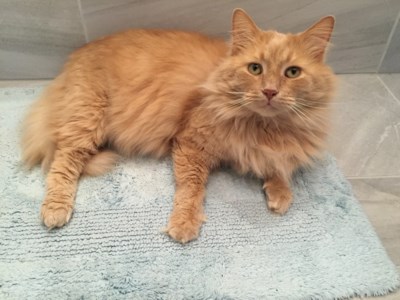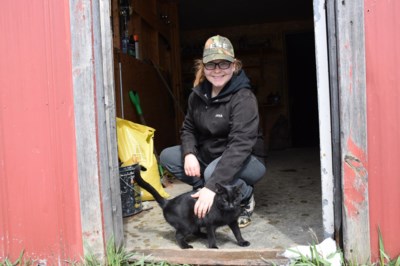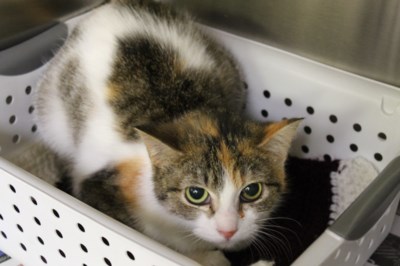Cats arrive on the doorstep of my daughter Alicia’s farmhouse in distressing numbers. She lives in a fairly isolated rural area a few hours away from here with her husband Mark and son Henry, and it’s not unusual for them to wake up and find a new cat peering into their window, looking for a home.
 Former stray cat Peete adopted Owen Roberts as his owner. Photo by Owen Roberts for GuelphToday.
Former stray cat Peete adopted Owen Roberts as his owner. Photo by Owen Roberts for GuelphToday.Our cat Peete came to us that way. Alicia’s become good at spotting strays that are likely someone’s unwanted house pets, ones that went for a ride in the country and never came back, destined perhaps to become barn cats.
But she could quickly tell Peete – distinguished by his friendliness and repeated attempts to scoot into the house – was not barn cat material. Peete found her house at the same time we were looking for a house cat. So, after a couple of weeks, Peete moved in with us.
However, an immediate problem arose. Peete was indeed as affectionate as could be, but he was stressed by his new environment and decided he needed to mark his territory in his new home. For the first couple of weeks, he urinated unpredictably throughout the house (thus the “Pee” in Peete) and we were at wits’ end.
Then he just stopped. Who knows why – he calmed down, I guess, and felt our house was his too. Lucky for us. He’s turned into a wonderful, charming companion. And lucky for him too, because he’ll never have to worry about food, shelter or affection again.
But not all such stories have a happy ending.
Outside of marking their territory, sometimes very established indoor cats simply decide to stop using their litter boxes. These cats are still lovable and friendly, but they create an untenable situation for homeowners.
The alternatives are limited: try turning them into outdoor cats, which presents a new set of challenges (for cat and owner), or give them to a humane society for adoption. It turns out this is a big reason cats are given up. And as you can imagine, they’re not so easy to adopt out.
 The Guelph Humane Society offers a barn cat adoption program. Pictured Jana Wisniewski with her adopted barn cat. Photo courtesy of photo Kasia Wisniewski.
The Guelph Humane Society offers a barn cat adoption program. Pictured Jana Wisniewski with her adopted barn cat. Photo courtesy of photo Kasia Wisniewski. For such cats, and others that are simply not indoor cats for whatever reason, the Guelph Humane Society (GHS) now offers a barn cat adoption program. Not all farmers are as well supplied with strays as my daughter and son-in-law; sometimes farmers need an external source of barn cats, which is what this program offers, while simultaneously finding a home for hard-to-place cats.
The barn cat program is in its sophomore year, after having successfully launched with the adoption of 16 cats last year. It’s looking forward to more placements in 2016.
And as with most things, timing is key.
The society is entering its busy season for cats. From April to October, the number of cats coming into the shelter – that is, the combination of intake of cats, as well as kittens born into their care from females that are pregnant upon intake -- account for about 65 per cent of the shelter’s total intake of cats for the year.
And while the GHS’s adoption percentage is about four times the national average, it was still hard-pressed to find homes for all 935 cats it took in last year. The barn cat program is designed to relieve some of that pressure, and at the same time, provide farmers with help controlling rodents.
 The multi-coloured Maia is still waiting for adoption though the Guelph Humane Society program. Photo courtesy of the Guelph Humane Society.
The multi-coloured Maia is still waiting for adoption though the Guelph Humane Society program. Photo courtesy of the Guelph Humane Society. It worked for GHS client Susan Gray. She and her family have a hobby farm about 35 minutes west of Guelph, and wanted to use cats instead of poison for mouse control in their partially converted chicken barn (which still has chickens, as well as four horse stalls and storage). She was open to any behavioural issue.
“They could be as wild as can be,” she says. “We had no expectations.”
So in February, she contacted the GHS and was matched with Bowie and Alan, a pair of one-year-olds who had been deemed unsuitable as house cats. On her farm, Bowie and Alan were housed and fed in a four-by-four foot cage for the first while, until they became acclimated to the barn. Gradually they were let out to roam. Now, they call the barn home.
“The cats don’t love being picked up, but they come to be petted and always come back to their cage,” says Gray. “They get along well with our dogs and horses. This is working out for us.”
Gray had the kind of housing the humane society looks for – a safe, secure barn or shed where the cat is protected from the wind and cold, where it’s warm enough inside that water won’t freeze in the winter. “Basically, we look for a place where that the cat will have a happy life,” says one GHS official.
.JPG;w=400) Saber recently found a home through the Guelph Humane Society barn cat program. Photo courtesy of the Guelph Humane Society.
Saber recently found a home through the Guelph Humane Society barn cat program. Photo courtesy of the Guelph Humane Society. In exchange, the society offers a barn cat – for free -- that has been spayed or neutered, vaccinated and dewormed, and brought up to health standards through the good graces of veterinary clinics and services in the city, including the Ontario Veterinary College.
Guelph doesn’t have a cat control bylaw like it does for dogs. This is a situation seen right across Canada, and contributes to the fact that Guelph alone has an estimated 10,000 cats at large. Some call them community cats; some believe they create significant problems for birds and homeowners who don’t want cats on their property. Discussions are underway that could see bylaws introduced forcing owners to be in control of their cats.
Meanwhile, the barn cat program offers an avenue for strays and other cats that don’t fit into traditional home settings. It gives them a chance to find roots, become part of a family, enjoy life…and pee where they want.
